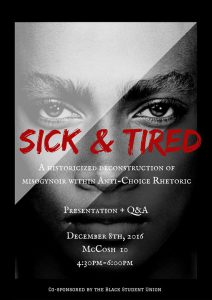
Link to Facebook event: https://www.facebook.com/events/601451940058587/
Today, there was a teach-in called “Sick and Tired: A Historicized Deconstruction of Misogynoir within Anti-Choice Rhetoric.” (I just realized that I should’ve shared the event with the class. Sorry about that!) The event was hosted by undergraduates Destiny Crockett ’17 and Trust Kupupika ’17. They provided a historicized breakdown of how anti-choice arguments regarding abortion have historically targeted black women and lead to impacts that ranged from the sterilization of Black women without their consent, to the surveillance of poor Black women who used social services to take care of their children. This breakdown was build through the framework of Dorothy Roberts’ Killing the Black Body and other essential scholarly and literary works that influence a nuanced understanding of reproductive liberty and race and gender justice.
This event is directly pertinent to our course, especially to our unit on reproductive rights. I know that my previous blog post on Sophia Vergara was on a similar topic, but I think it’s interesting to put these two events next to each other because one is in the context of pop-culture, and the other is in the context of academia. It is important to realize how different platforms can be used to develop different frameworks of understanding around the same issues and that all these frameworks are valuable.
In regards to the “Sick and Tired” event, I appreciated Crockett and Kupupika’s introduction to the word “misogynoir” because it hones in on the violence that black women specifically experience at the hands of anti-choice ideology. To me, their use of this word shines a light on the importance of language in discussing systems of oppression against particular groups of people because it makes articulating these systems easier and more tangible.
Additionally, this teach-in was especially important in light of a previous event that happened on campus that essentially discussed how black women should adhere to pro-life ideology. I was proud to see that Crockett and Trupupika were able to go against the blatant transmisogynoir rhetoric that was tied to that event.
I wanted to hear people’s thoughts on either of the two events that I mentioned (to the capacity of your knowledge about them). Moreover, I would like to hear more about how we can have critical conversations around these types of issues on college campuses that utilize not just academic framework, but also others.